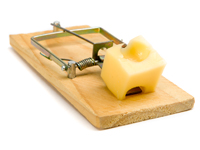
Rodents #1 reputational risk for businesses this winter
Following the first cold snap, leading pest control experts are urging business owners to be vigilant of rodent infestations to prevent reputation backlash and physical damage to their business.
Simon Lean, Australian technical manager at Rentokil said rodents, which include rats and mice are most prevalent in the colder months as they seek refuge indoors, looking for both shelter and food.
“A rodent infestation can quickly get out of control, within a period of a year a single pair of mating rodents can result in a rodent population of 400-700. Female rodents are capable of giving birth to between five to 10 offspring more than four times a year and that offspring is ready to reproduce just three months after birth,” said Mr Lean.
“We have already seen an increase in commercial rodent job call outs, from summer 2012/13 to autumn 2013 there was a spike of 18%. We are expecting to see a further increases so businesses should definitely start preparing for potential rodent infestations in winter and have adequate rodent control programs in place.”
The most common pest rodent species in Australia are the black rat, brown rat (Norway rat), and house mouse, all of which are widespread throughout Australia’s highest populated areas. Rodents are nocturnal and build their nests in wall cavities, under floors, roof voids and close to areas where they can scavenge for food and water. They can all carry diseases by leaving infected urine or faeces in places where people can come in contact such as kitchen benches, food preparation and storage areas and rubbish tips. The effect of rodents can consequently be more serious for businesses serving or selling food and businesses with large storage areas, where rodents can find areas with food, shelter and nesting sites during winter.
Danger signs
• Droppings – rodents leave small, dark droppings particularly along walls or in enclosed areas such as cupboards or under sinks. Rat droppings are sausage shaped, approximately 1 -2 cm long and mouse droppings are thin, spindle shaped and approximately 5mm long
• Distinctive smell – if you detect an ammonia-like smell that is particularly strong in more enclosed areas, the chances are it may be due to rodents
• Damaged stock and damage to fabric of premises
• Nesting material — rodents build nests with shredded material such as newspaper, cardboard and fabrics
• Damage – rodents have teeth that grow continuously and will gnaw on wood, plastic, cables and other hard materials which can be a fire hazard
• Smears – grease marks from the rodents body as they repeatedly brush up against objects
Potential harm
• Rodents are known to spread infections such as salmonella, Weil’s disease, E coli, tuberculosis and hantavirus
• Damage to stock and buildings
• Contamination of foodstuffs and goods
Business consequences
• Alarm — immediate loss of customer and employee trust which will affect the bottom line
• Damage — to goods, foodstuffs and your health and hygiene reputation
• Cost — can be considerable, temporary closure may be necessary which means loss of business and the costs of replacing damaged stock
• Legal — failure to comply with legislation
Preventative measures
• Hygiene and housekeeping should be a key focus with thorough, regular cleaning taking place frequently to avoiding infestation
• Crates and boxes should be stacked 70cm away from the wall to ensure you can check what’s behind them
• Set up a contractual relationship with your pest controller, rather than hiring them on a reactive basis to ensure there is no risk of recurring infestations
• Staff need to be educated on the risks of infestation and act responsibly
• If you do spot a rodent on your premises it is essential to seek professional advice immediately
• If you own a property that is standing empty for any period of time, make sure you inspect it regularly to look for any signs of rodent activity
• Seal up holes in the building to keep rodents out
• Ensure all pipe-work is in good working order
• Look after your drains, clean them regularly to avoid infestations and unblock gutters

AccomNews is not affiliated with any government agency, body or political party. We are an independently owned, family-operated magazine.







